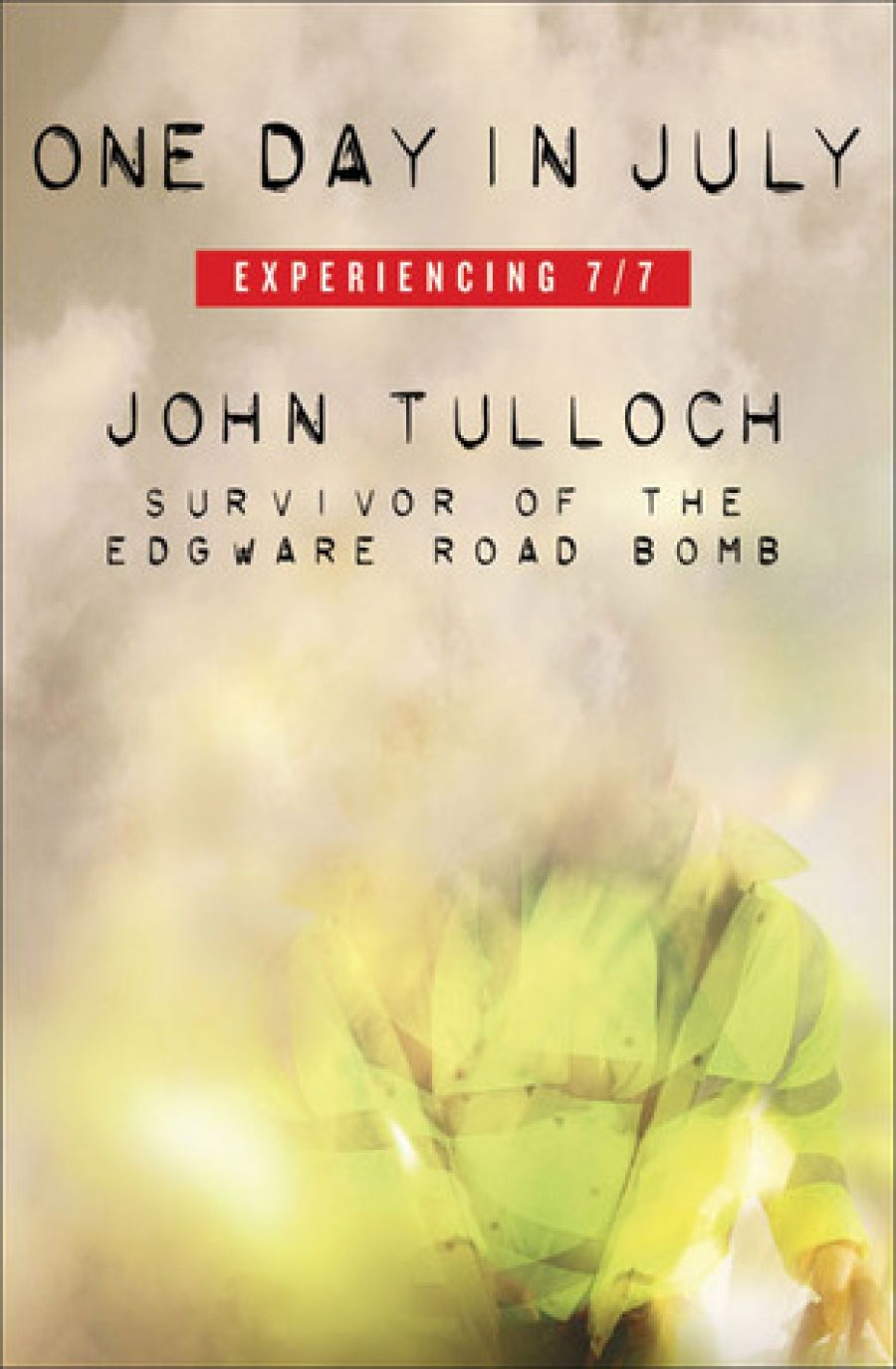
- Free Article: No
- Contents Category: Memoir
- Review Article: Yes
- Online Only: No
- Custom Highlight Text:
On the face of it, One Day In July might induce a state of groaning, as yet another ‘victim’ with attendant publisher prepares to cash in by virtue of a rank media with an appetite for ‘terror’. Remember Douglas Wood, hostage in Iraq, triumphant with that VB stubby in hand? Now our potential hero is Experiencing 7/7 across the front cover as Survivor of the Edgware Road Bomb. One wonders how many more dates, not to mention people, will be claimed and maimed in this manner. On the back: the injured figure of the author, as seen in newspapers and by television audiences worldwide, repeated.
- Book 1 Title: One Day in July
- Book 1 Subtitle: Experiencing 7/7
- Book 1 Biblio: Little, Brown, $29.95 pb, 232 pp
The core of this book is constituted by ‘how we relate’ in a world where international events have local effects and where local actions – those of an individual, say, on the morning train – harbour, as Tulloch is at pains to point out, global consequences. The author’s unique autobiographical position and his multifarious perspectives are of great appeal: academic insight gains an extra honesty when read against intense emotional experience, nowhere better exemplified than in his concluding letter to Mohammad Sidique Khan, with whom he exchanged glances on the train seconds before. As a citizen, an expatriate Australian in the United Kingdom, Tulloch abhors ‘the culture of fear’ in which he is forced to live, a product of ‘political spin’; he implores us as ‘citizens’ to think, to be ethical, to ask questions; and it is as a citizen that he most wants to be heard. One feels a major difficulty for Tulloch here: could such a hearing, like gossip, heighten the hullabaloo and strengthen the very culture it attempts to counter? In his attempt to attract a broad demographic, must Tulloch then sell the very images, such as his bloody face, which the public are preconditioned to see?
Tulloch does not find answers, but offers a way of speaking through a wider narrative. Initially, ‘discrete images’ persistently feature to personalise his politics and to retrieve his identity, both of which have been destroyed by the blast and the images thereafter. The narrator – aware, in a classical sense, that wars make heroes and heroes wars – presents himself as an anti-hero, something achieved by frequent references to vertigo, vomiting, bouts of whingeing, and apparently selfish despair.
Meanwhile he parallels the media’s contemporaneous imaging: brave face of the heroic victim smiling at Prince Charles from a hospital bed, taking strength from the dignitary. Significantly, this and other photographs are included so that one can interpret his interpretation. In addition to discrete images, ‘small targets’ are repeatedly set as manageable steps through which the author’s personal recovery, slow and painful, becomes a metaphor for how a society might also find its way. Tulloch dismantles the images he has used to attract his reader and moves closer to the democratic issue, which he concentrates in the image of ‘the dead Brazilian’ (the fifth chapter of ten). Further into his recuperative process, the reader is provided with utensils – analyses of television, newspapers, theatre, literature and fine arts, sources from which he quotes heavily – to create an ‘alternative democracy’, a mini-world of dissonant voices. Thus the author subverts the narrative in his recovery, by replacing a ‘culture’ with well-meaning fragments, the conjectural tone of which portrays (and betrays) his notable optimism for a democratic functioning of the media – consistently preferring the term ‘political spin’ to ‘media spin’. But are not politics and the media two sides of the same deleterious coin? At times, Tulloch’s optimism seems slightly misplaced in a discourse that directs more focus to the smokescreen – as literally pictured on the front cover – than on what lies behind it (for this see Robert Fisk’s The Great War for Civilisation [2005], a brilliant historical account), although he undoubtedly achieves his aim of ‘pointing to an alternative way of speaking’. Tulloch’s intelligent moral response in the face of personal adversity is of the greatest importance. In an electorate more worried by interest rates, One Day in July raises questions that concern us all, never more so than in the wake of recent developments in Britain.


Comments powered by CComment